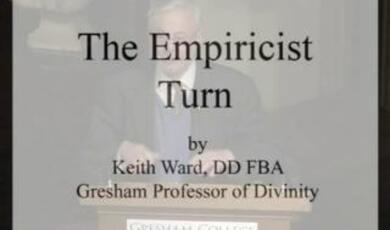Is our future fixed by causes that were in operation before we were born?
Share
- Details
- Text
- Audio
- Downloads
- Extra Reading
We shall need to consider the nature of causal explanations, including in economics, the nature of coincidences, and the relation between cause and necessity.
Download Text
Is our future fixed by causes that were in operation before we were born?
Professor Richard Sorabji
Is it fixed what you are going to do tomorrow - next week - next year? The most popular argument for its being fixed goes as follows. Whatever happens has a cause, and that cause has an earlier cause, and the chain of causes of your future action extends backwards to before you were born. So you never had any chance of doing otherwise. It was fixed, necessary, or inevitable all along. We need not use the name, but those who believe in such fixity are called ‘determinists’, and when, as here, they base their view on considerations of cause and effect, they are called ‘causal determinists’.
Many of us do not like their idea that we cannot do otherwise. But they will reply to us, that if we deny that a prior chain of causes fixes our actions, we will make them random and inexplicable. And that can hardly give us any comfort.
Let us take first their premise, or the ground for their conclusion. I believe that Aristotle refuted it, but that has not been widely recognised. He is often thought not to have addressed the subject at all. When he does address it, he does so in a passage that has been considered baffling,Metaphysics Book 6, Chapter 3. And, strictly speaking, what he refutes is the idea that whatever happens has an explanation. But since he thinks - and I agree for reasons I will explain - that a cause is a type ofexplanation, he has, in my view, refuted the idea that whatever happens has a cause.
Coincidences lack causes
His counter-example is a coincidence. Suppose, he says, that a thirsty man goes to the well to drink. Let the time be 2 p.m. There may be perfectly good explanations and causes of his going there at exactly that time. He ate spicy food, and so was thirsty. Let us say he ate at 1 p.m. , and so was thirsty by 2. Now Aristotle introduces the coincidence. Some ruffians also go to the well at 2. There may have been perfectly good explanations and causes of their going there just then. Perhaps they were thrown out of the tavern then, because they had got drunk. The coincidence was the fact of the thirsty man and the ruffians going to the well at the same time. The coincidence might have tragic consequences, Aristotle suggests. The drunken ruffians kill the thirsty man. His death is not itself a coincidence, but is rather the result of a coincidental meeting at the well.
Does the coinciding of the parties at the well have a cause and explanation? After all, there is a cause and explanation, we have supposed, of each party arriving there at exactly 2 p.m. But what Aristotle has seen is that it does not follow from each arrival and its timing having a cause and explanation, that the simultaneity of arrival has a cause or explanation. The 2 explanations for the timing of the 2 separate arrivals does not add up to an explanation of the simultaneity.
Let me try to bring out Aristotle’s point by two examples. A little girl asks, ‘why does it have to rain on my birthday?’. What she is seeking is not an explanation of why it has to rain today (a story about current barometric pressures) coupled with a story about why it has to be her birthday today (a story about what her parents did earlier). No, the sort of thing that would answer her question, if it were true, would be, ‘it is raining on your birthday because you have been naughty’. Of course, we do not believe that any such explanation relating the rain to the birthday is true. And to mark that, the right thing to say is, ‘There is no explanation; it is acoincidence’.
Coincidences have no explanation. When I first discussed this,1 I gave an example that has been considered prophetic, although it concerned five aircraft, not four. Suppose five aircraft crash on one day. The Air Safety Board wants to know why there were five crashes on one day. There might be an explanation, if, for example, it was due to a terrorist plot. But suppose the five crashes each had an entirely separate explanation of its occurrence and timing: the drunken pilot, the broken bolt, and so on. Then the right answer to the Safety Board’s question, ‘Why five on one day?’ would be, ‘There is no explanation; it was a coincidence’. What concerned the Board was the simultaneity of the five, and for the simultaneity the five separate explanations of the five separate timings is not an explanation. Coincidences have no explanation, and so, if a cause is a kind of explanation, they have no cause.
Are effects explained or necessitated?
Let me now turn to the second question. Is it true that a cause is a kind of explanation, as Aristotle thinks,2 or should we instead accept the rival view of those who threaten that our future actions are fixed? For they have a view about what sort of thing a cause is. They connect cause withnecessitation, whereas I would be connecting it with explanation, and as I shall argue, necessitation and explanation do not go hand in hand. On the rival view, what is caused is necessitated. A cause is thought by our rivals to be, or to be part of, a set of conditions that necessitate the effect. They can put the same point in different ways. Instead of talking about necessitation, they may talk about an inevitable law. On this formulation, if A causes B on a particular occasion, then some universal law will hold true, which calls it inevitable that whenever situations occur that are like A in some specified respect, then there will occur situations that are like B in a specified respect. Again, instead of talking of an inevitable law, they may express the idea in terms of ‘were ’ and ‘would ’. If ever a situation of the first kind were to happen, a situation of the second kind wouldhappen. All these are ways of saying that what is caused is necessitated.
In reply, I think it can be shown that what is caused need not be necessitated. If Quantum Physics is right, there are many actual cases in which it is not necessitated. Of course, science may get revised, but at least contemporary science is not on the side of our opponents. We do not have to rely on science, because I shall later argue that there are innumerable cases in which, for all we know, the caused outcome is not necessitated. But let us start by exploiting current science, which offers theoretical reasons for a view stronger than ‘for all we know’. The stronger view is that the outcome is definitely not necessitated.3 Suppose that a technician leaves out a small lump of radioactive material on a laboratory bench for a while. According to most quantum physicists, the rate and route of radioactive transmission is definitely not fixed, but is undetermined, and it is therefore undetermined whether radiation will reach a given point in the time available. Suppose that a visitor takes a brief look in the room, poking their head through the door, and happens to be hit by a radioactive particle. This would be of particular interest, if the visitor contracted cancer as a result. But I will take the earlier stage at which he or she is hit. It matters to the argument what stage is taken up for discussion. What I want to say is that the visitor’s being hit is, according to Quantum theory, an unnecessitated effect of the uranium having been left out. It is unnecessitated, because, according to Quantum theory, it was not determined right up to the moment the visitor was hit that the radioactive particle would take that route.
A question might be raised as to whether being hit is an effect. Certainly, that is what we would ordinarily say, but there is a rather idiosyncratic, but currently popular, view that only events can serve in particular cases as cause and effect, and that only facts can feature in explanations. On this view, what we have in the story so far is the fact of uranium having been left out explaining the fact of the visitor getting hit, and the event of leaving out the uranium causing, but not explaining, the event of being hit. One problem with this is that the relation between cause and effect is supposed on this view, at least by our opponents, to be one of necessitation or of law, and that is just what Quantum physicists deny to be available in this case. Another problem is that one event in our story does seem to explain the other, even if it does so via the corresponding facts. The artificial restriction of cause and effect to events is just one of many theories in the History of Philosophy, and the opposite assumption is just as common and just as implausible. The ancient Stoics, for example, said that causes were always bodies, like the knife which cuts an apple, and effects were always things predicated of bodies, as being cut is predicated of an apple, so that neither was an event.4 The Neoplatonists offered examples of cause and effect in which no events even so much as occurred. A foot beginninglessly implanted in a cushion might for ever have caused a dent in the cushion, without there ever having been an event of the foot’s being implanted.5
But an objection might be made to me in particular as to how I can regard the visitors being hit as an effect, since on my view an effect is something explained by the cause, and in this case there is no sufficient explanation of the hit. To answer this, I must say something about explanation. Explanation, as Michael Scriven has argued,6 is relative to the question asked. When someone asks for an explanation, they often (not always) have a contrast in mind. Why was the visitor hit, in face of the fact that so small a quantity of uranium, exposed for so short a time, would seldom irradiate someone who looked from just one angle? To this there is no answer. But ask another question. Why was the visitor hit in face of the fact that it is normally safe to walk round the laboratories? In face of thisfact, it is a perfectly good explanation that the uranium was left out on the bench. That explains the contrast that the questioner had in mind between the safe rooms and this room. It distorts the situation to say that there is no explanation of why the visitor was hit. The truth is rather that in relation to one question there is no explanation, but in relation to another there is.
There may still be a feeling that the explanation is not complete because it does not represent the visitor’s being hit as inevitable. But the same point applies again, that what counts as completeness in an explanation depends on the question asked. In Scriven’s example, directions for reaching the public library can be complete, without giving the spatial coordinates of every intervening molecule of air, just so long as they are geared to the needs of the questioner. If our question is, ‘Why this room and not others?’, the explanation is complete. And in this case, the complete explanation, so far from guaranteeing the outcome of the visitors being hit, might produce such an outcome only very rarely.
Once it has been admitted that, if Quantum Physics is right, some things are effects caused without being necessitated, the question arises whether this may not often (not always) be the case in other areas too. May not this be the case with something as everyday as whether we catch a cold? Might this not sometimes be caused without being necessitated? And might there not, at least for all we know, be innumerable examples in the sphere of human conduct? Let me give two examples. The case for attending some instructive lecture series may seem overwhelming; despite the long journey required, and 9 times out of 10 a person may attend accordingly. But what if the tenth time, the person does not attend, and this not because of some new obstacle? Our opponent, the determinist, would say there must be some new disincentive tipping the scales, or the person’s non-attendance would be inexplicable. But now we know that what cannot be explained is the person’s not attending the 10th time, in face of the fact that they attended the other 9. But in face of the fact that this is a motivated person, we can explain the non-attendance perfectly well by reference to the length of the journey. The situation need not have been relevantly different the 10th time. If our opponent says that it must have been, this is an expression of faith. In that case, we can see the 9 attendances as perfectly explicable and caused by the person’s interests, yet, as the 10th occasion shows, not necessitated.
Here is a second example. Suppose a normally well-behaved child is told not to take his brother’s toy. But this time, uncharacteristically, he does. Whichever he had done, his conduct would have been explicable, whether by reference to his keenness to please his parents, or by reference to his thoughts about the attractions of the toy. But why should we suppose that his action must have been necessitated?
We can now answer our opponent’s objection, that if the action is not necessitated, it would be random and inexplicable. On the contrary, we have seen that in relation to many questions, often the most relevant ones, the conduct may be perfectly explicable. We should hardly expect that it would be explicable in relation to every question we might think up.
Let me now return to some of the rival accounts of what a cause is. I have tried to answer the opponent’s view, that a cause is part of some necessitating conditions. This would have meant that effects were all necessitated. But the Quantum example shows, I believe, that current science does not think this, and nothing forces us to think it. The effect of being hit, in our example, is caused by a cause which is not part of some necessitating conditions. For it is not necessitated at all, but may, on the contrary, be an outcome of a very abnormal sort. Equally, the example disproves the equivalent accounts of cause which postulate an inevitable law about what always happens. Such hitting would not always happen, much less inevitably. Nor can it be said that if uranium in that quantity were to be so placed for so long, a visitor at that angle would be hit. A visitor would be so hit only occasionally.
What I want now to add is that the other most popular modern accounts of what a cause is can also be defeated by the single example of the uranium. For some people say that a cause at least makes its effect more probable. Another view is that a cause is a necessary prerequisite for the effect in the circumstances. These accounts talk not of necessitation, but of probabilification, or facilitation. But David Hume wanted none of these, for he saw none of them in nature. We may indeed believe there is necessitation when we speak of cause and effect, but all there really is is a constant conjunction of events like the cause with events like the effect with no necessitation at all.
These alternative accounts of cause are also refuted, I believe. There is, according to Quantum Physics, no constant conjunction between such exposure of such lumps of uranium and radiation hitting objects at such an angle and distance. Nor need the presence of the uranium have created the possibility, or made it more probable, that the visitor would be hit at least by some radiation. It might have made it less probable. For imagine that the anti-terrorist police viewed our visitor as a suspect, and had decided to assassinate him at that very moment and place with a radiation gun. They were lying in wait for him, but seeing him visit the room where uranium was exposed anyhow, decided they need not bother. In that case, the uranium was not a necessary prerequisite for his being hit at least by some radiation. And the exposure of the uranium need not have made it more probable that he would be hit by some radiation. It might have made it less probable, for their radiation gun might have been an extremely effective weapon, whereas the uranium, although they did not realise that, might have been very unlikely indeed to irradiate him. Of course, it would not be the same electron that hit him from the gun, but since electrons do not differ in their qualities, that is only to make the trivial point that it would not be an electron from the same source. Naturally, the uranium on the bench was necessary for his being hit by an electron from that uranium, and its presence made his being so hit more probable than zero %. But the probability might still be a great deal less than 1%.
If the favourite modern accounts of causation are all vulnerable to the one counter-example, we have an incentive to go back to Aristotle’s account of causation as a kind of explanation, which I have favoured all along. But I should explain two things. First, Aristotle means an explanation not in the sense of a linguistic entity, but of an explanatory factor, something that provides an explanation. Secondly, it provides a particular type of explanation. he himself distinguishes cause as we understand it as only one of four types of explanatory factor, in Physics2.3. This type came to be called ‘efficient cause’. It does not explain in the way that a purpose explains, or a thing’s material constituents, or its defining characteristics. As to haw it does explain, Aristotle says a little but not enough. His account is therefore incomplete. But being incomplete is better than being wrong, as I have suggested the modern alternatives are. The claim that a cause is some type of explanatory factor seems to me true as far as it goes.
Let me now take stock of what has happened to the threat that was posed by our deterministic opponent, who said that what we will do tomorrow has been fixed since before we were born by a chain of causes stretching back at least that far, and that otherwise indeed our actions would be random and inexplicable. His premise, that whatever happens has a cause, was, I think, shown wrong by Aristotle’s example of coincidences. His claim that our actions will turn out random and inexplicable has been answered by explaining more about the relativity of explanation to the question asked. His connexion of fixity or necessitation with cause and effect has been answered, I believe, by the example of the uranium, which applies, for all we know, to innumerable examples in everyday life. The latter replies depended on distinguishing sharply between necessitation and explanation. Cause was associated with explanation, and explanation was divorced from necessitation.
1 Richard Sorabji, Necessity Cause and Blame, Duckworth, London 1980, US edition Cornell University Press, Ithaca New York 1980, Chicago University Press 2005, Chs 1 and 2, covers the subject of this lecture.
2 Aristotle Physics 2.3.
3 I am here developing an example given by Elizabeth Anscombe, ‘Causality and extensionality’, Journal of Philosophy 65, 1968, 152-9.
4 See translations in A.A.Long, D.N.Sedley, The Hellenistic Philosophers, Cambridge 1987, vol 1, 55 A-D, of Stobaeus, ed.Wachsmuth, 1.138,14 - 139,4; Sextus Against the Professors 9.211; Clement of AlexandriaMiscellanies 8.9.26.3-4 and 8.9.30.1-3.
5 Augustine City of God 10.31 reports this.
6 Michael Scriven, ‘Explanations, predictions and laws’, Minnesota Studies in the Philosophy of Science, vol. 3, ed. H.Feigl and G.Maxwell, Minneapolis 1962.
© Professor Richard Sorabji, 2002
This event was on Wed, 11 Dec 2002
Support Gresham
Gresham College has offered an outstanding education to the public free of charge for over 400 years. Today, Gresham College plays an important role in fostering a love of learning and a greater understanding of ourselves and the world around us. Your donation will help to widen our reach and to broaden our audience, allowing more people to benefit from a high-quality education from some of the brightest minds.


 Login
Login







